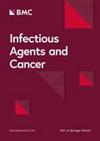CD8+NKT细胞和NK细胞上CD16-CD56与肝细胞癌的因果关系:孟德尔随机研究
IF 3.1
2区 医学
Q3 IMMUNOLOGY
引用次数: 0
摘要
肝细胞癌(HCC)是一种原发性肝脏恶性肿瘤,在全球具有高发病率和高死亡率的特点。最近,大量支持性证据显示,NK 细胞相关免疫特征与 HCC 的发生密切相关,但它们之间的因果关系尚未得到证实。为了探究 NK 细胞相关免疫特征与 HCC 之间的因果关系,我们进行了双样本孟德尔随机化(MR)研究。NK 细胞相关免疫特征的遗传变异是从最近对欧洲血统个体进行的全基因组关联研究(GWAS)中提取的。HCC数据来自英国生物库联盟的GWAS汇总计数数据,包括总共372,184名女性和男性受试者,其中有168例病例和372,016例对照,所有受试者均为欧洲血统。敏感性分析主要用于异质性和多义性检验。我们的研究表明,NK 细胞相关免疫特征与 HCC 之间存在因果关系。重要的是,CD8+NKT 细胞对 HCC 具有保护性因果效应(OR = 0.9996;95%CI,0.9993-0.9999; P = 0.0489)。CD16-CD56 对 NK 细胞的影响(OR = 0.9997;95%CI,0.9996-0.9999;P = 0.0117)与 CD8+NKT 细胞相似。来自 Egger 的截距显示没有多重效应和混杂因素。此外,通过 Cochran's Q 检验发现,没有足够的证据支持异质性的存在。MR分析表明,CD8+NKT细胞和NK细胞上CD16-CD56的低表达与较高的HCC风险有关。本文章由计算机程序翻译,如有差异,请以英文原文为准。
The causality between CD8+NKT cells and CD16−CD56 on NK cells with hepatocellular carcinoma: a Mendelian randomization study
Hepatocellular carcinoma (HCC), which is featured with high morbidity and mortality worldwide, is a primary malignant tumor of the liver. Recently, there is a wealth of supporting evidence revealing that NK cell-related immune traits are strongly associated with the development of HCC, but the causality between them has not been proven. Two-sample Mendelian randomization (MR) study was performed to probe the causal correlation between NK cell-related immune traits and HCC. Genetic variations in NK cell-related immune traits were extracted from recent genome-wide association studies (GWAS) of individuals with European blood lineage. HCC data were derived from the UK Biobank Consortium's GWAS summary count data, including a total of 372,184 female and male subjects, with 168 cases and 372,016 controls, all of whom are of European ancestry. Sensitivity analysis was mainly used for heterogeneity and pleiotropy testing. Our research indicated the causality between NK cell-related immune traits and HCC. Importantly, CD8+NKT cells had protective causal effects on HCC (OR = 0.9996;95%CI,0.9993–0.9999; P = 0.0489). CD16−CD56 caused similar effects on NK cells (OR = 0.9997;95%CI,0.9996–0.9999; P = 0.0117) as CD8+NKT cells. Intercepts from Egger showed no pleiotropy and confounding factors. Furthermore, insufficient evidence was found to support the existence of heterogeneity by Cochran's Q test. MR analysis suggested that low CD8+NKT cells and CD16−CD56 expression on NK cells were linked with a higher risk of HCC.
求助全文
通过发布文献求助,成功后即可免费获取论文全文。
去求助
来源期刊

Infectious Agents and Cancer
ONCOLOGY-IMMUNOLOGY
CiteScore
5.80
自引率
2.70%
发文量
54
期刊介绍:
Infectious Agents and Cancer is an open access, peer-reviewed online journal that encompasses all aspects of basic, clinical, epidemiological and translational research providing an insight into the association between chronic infections and cancer.
The journal welcomes submissions in the pathogen-related cancer areas and other related topics, in particular:
• HPV and anogenital cancers, as well as head and neck cancers;
• EBV and Burkitt lymphoma;
• HCV/HBV and hepatocellular carcinoma as well as lymphoproliferative diseases;
• HHV8 and Kaposi sarcoma;
• HTLV and leukemia;
• Cancers in Low- and Middle-income countries.
The link between infection and cancer has become well established over the past 50 years, and infection-associated cancer contribute up to 16% of cancers in developed countries and 33% in less developed countries.
Preventive vaccines have been developed for only two cancer-causing viruses, highlighting both the opportunity to prevent infection-associated cancers by vaccination and the gaps that remain before vaccines can be developed for other cancer-causing agents. These gaps are due to incomplete understanding of the basic biology, natural history, epidemiology of many of the pathogens that cause cancer, the mechanisms they exploit to cause cancer, and how to interrupt progression to cancer in human populations. Early diagnosis or identification of lesions at high risk of progression represent the current most critical research area of the field supported by recent advances in genomics and proteomics technologies.
 求助内容:
求助内容: 应助结果提醒方式:
应助结果提醒方式:


